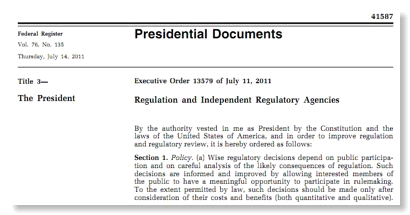Retrospective Analysis at the FCC
The title of this post was also the title of a 8/9/11 post by Ruth Milkman on the FCC’s own blog. It describes FCC implementation of a 7/11/11 Executive Order entitle “Regulation and Independent Regulatory Agencies” -- which it oddly did not give a link to it or even its EO number - 13579, as shown above. (See, SpectrumTalk is nicer to its readers than FCC’s blog!)
The core of EO is the following:
To facilitate the periodic review of existing significant regulations, independent regulatory agencies should consider how best to promote retrospective analysis of rules that may be outmoded, ineffective, insufficient, or excessively burdensome, and to modify, streamline, expand, or repeal them in accordance with what has been learned. Such retrospective analyses, including supporting data and evaluations, should be released online whenever possible.
This policy is similar to the Carter Administration’s Executive Order 12044 that I have previously written about here and that was the initial impetus to what became Wi-Fi and Bluetooth. Regulation of a dynamic technology such as wireless technology is bound to become anachronistic and need updating. This need for updating in turn leads to delays for new technology and discourages capital formation for new technology. As Mitch Lazarus has written in comments in the “Wireless Innovation NOI” (which has seen no Commission action in over 2 years!),
Often a radically new technology comes from a small, privately-funded start-up. Its only product may be the one awaiting Commission approval. These companies may lack the resources to survive a lengthy FCC proceeding.
Several FCC sua sponte deregulatory spectrum initiatives that I initiated have resulted in product development that has stimulated economic growth. Such initiatives are not popular with industry insiders and conservative FCC staffers who prefer focus on the the spectrum analog of “no one ever got fired for buying IBM”. Here are some specific initiatives and their impact:
- Docket 81-413 - Wi-Fi, Bluetooth, and ZigBee
- Docket 83-114 - via successor Docket 85-171 resulted in technical deregulation for Part 90 modulation and bandwidth
- Docket 94-124 - 60 GHz products such as 802.11ad
- Docket 96-35 - permitted flat microwave antennas implicitly forbidden by previous rules
- Docket 02-146 - commercialization of 70/80 GHz bands
Ms. Milkman writes in the FCC blog,
The President's directives are consistent with the values and philosophy we apply here at the FCC. In a press conference following the release of the July 11 Executive Order, Cass Sunstein, the head of the Office of Information and Regulatory Affairs in OMB, noted that the FCC has a robust regulatory review process in place. Under Chairman Genachowski's leadership, we are proud of the progress we have made so far.
I do not disagree with much of what she writes, however, there are real limitations to the 47 USC 161 biennial review process that I think she was referring to. The statute refers to review of “all regulations issued under this chapter in effect at the time of the review that apply to the operations or activities of any provider of telecommunications service”. In the past, the Commission has interpreted Section 161 in the narrowest possible sense to limit its work. Indeed, I recall during the Powell chairmanship numerous efforts were made by upper commission leadership to limit the scope of biennial review and keep it as narrow as possible so it would not be a distraction to the current agenda.
For example, I filed comments in the 2008 review. Perhaps these were brilliant comments, perhaps not. What happened to these comments? Well, in July 2010 when the results of the biennial review were released - a time during the Genachowski chairmanship - FCC dismissed the comments based on a narrow interpretation of the statute stating,
" the comments did not suggest that the rules should be repealed or modified because they are no longer in the public interest as the result of meaningful economic competition between telecommunications service providers. Accordingly, OET concluded that these comments were beyond the scope of the section 11(a) review".
Thus a narrow interpretation of Section 11(a)/47 USC 161(a) was seen as a preferred alternative to considering the merits of the suggestion!
This I have submitted to the FCC blog a comment stating that if they are serious about “retrospective analysis” they could start by looking at ALL the biennial review proposals in recent years that were dismissed for such bureaucratic reasons and consider them on their merits - not narrow interpretations of Section 11! But while we at at it, how about some action on the Wireless Innovation NOI (09-157)?




![Validate my RSS feed [Valid RSS]](valid-rss-rogers.png)

